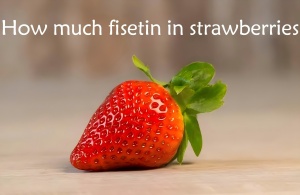How much fisetin in strawberries

How much fisetin in strawberries? If you’re exploring natural ways to boost your intake of this powerful flavonoid, strawberries are often highlighted as the richest food source. But exactly how much fisetin do they contain—and is it enough to deliver health benefits?
What Is Fisetin and Why Is It Important?
Fisetin is a plant polyphenol known for its antioxidant, anti-inflammatory, and senolytic properties. It supports cellular health, cognitive function, and may even promote longevity. While fisetin supplements are growing in popularity, many health-conscious consumers prefer getting nutrients through whole foods like strawberries.
Fisetin Content in Strawberries
1. Measured Amount of Fisetin
Research shows that strawberries contain approximately 160 μg (micrograms) of fisetin per gram of fresh weight. This makes strawberries the highest known natural source of fisetin among fruits and vegetables.
How much fisetin in strawberries? In practical terms, one cup of fresh strawberries (around 150 grams) provides about 24 milligrams of fisetin. While this is lower than most supplement doses, it’s still a meaningful contribution to your daily antioxidant intake through food.
2. Comparison With Other Fruits
For context, apples and onions contain significantly lower amounts of fisetin—typically less than 10 μg per gram. So if you’re trying to maximize natural fisetin intake, strawberries are clearly the superior choice.
Can You Get Enough Fisetin From Strawberries Alone?
Though strawberries offer a natural source of fisetin, reaching levels used in scientific studies (typically 100–1000 mg/day) would require eating several pounds of strawberries daily. That’s why many opt for supplementation.
How much fisetin in strawberries matters when planning your diet, but it's important to note that fisetin's bioavailability and effects may differ depending on the form—natural food vs. extracted supplement.
Health Benefits of Fisetin From Strawberries
1. Natural Antioxidant Support
Consuming fisetin from strawberries may help fight oxidative stress, reduce inflammation, and support healthy aging.
2. Gut-Friendly and Nutrient-Rich
Strawberries also provide fiber, vitamin C, manganese, and other polyphenols that work synergistically with fisetin to promote wellness.
Conclusion: Should You Eat Strawberries for Fisetin?
How much fisetin in strawberries is enough depends on your health goals. If you want a clean, delicious source of natural fisetin, strawberries are your best bet. However, if you're targeting higher therapeutic levels—like those used in anti-aging or senolytic research—supplements may be more effective.
Still, incorporating strawberries into your daily diet is a healthy and enjoyable way to boost your antioxidant intake and reap a range of additional nutritional benefits.
